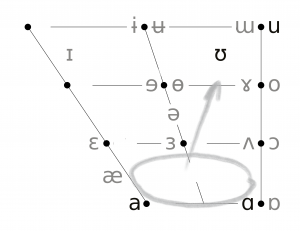16 The MOUTH Lexical Set
 A Closing Diphthong goes from wherever the nucleus starts to a close coda. The most common type of mouth vowel is a wide closing diphthong, where the nucleus of the diphthong is open [a ~ ɑ], which then off-glides up and back towards [ʊ̯], so we have [aʊ̯ ~ a̠ʊ̯ ~ ɑ̟ʊ̯ ~ ɑʊ̯]. There are many other variants for mouth: Bernd Kortmann’s Varieties of English lists 6 (!) variations 4 different diphthong and 2 monophthong options. There are also accents with allophonic variations—Canadian Raising being perhaps the most famous example of this—that have one version of mouth before a voiceless consonant, and a different version before a voiced consonant or vowel (sometimes called alternate keyword “proud,” named to parallel a similar change happening to the price lexical set, which goes by “pride/pried”).
A Closing Diphthong goes from wherever the nucleus starts to a close coda. The most common type of mouth vowel is a wide closing diphthong, where the nucleus of the diphthong is open [a ~ ɑ], which then off-glides up and back towards [ʊ̯], so we have [aʊ̯ ~ a̠ʊ̯ ~ ɑ̟ʊ̯ ~ ɑʊ̯]. There are many other variants for mouth: Bernd Kortmann’s Varieties of English lists 6 (!) variations 4 different diphthong and 2 monophthong options. There are also accents with allophonic variations—Canadian Raising being perhaps the most famous example of this—that have one version of mouth before a voiceless consonant, and a different version before a voiced consonant or vowel (sometimes called alternate keyword “proud,” named to parallel a similar change happening to the price lexical set, which goes by “pride/pried”).
mouth can be in both Free and Checked syllables, both stressed and unstressed.
- 🕊Free: does not require a following consonant, and can exist on its own, e.g. ow, bough=bow
- in stressed and unstressed syllables
Spellings
The mouth Lexical Set has no subgroups, unlike many other lexical sets; this means that if you can identify a mouth word, you’re probably on track! However, there is at least one allophonic variant, when mouth is followed by a voiceless consonant, so depending on the accent you’re working on you may have to pay attention to which version of the mouth set you’re using.
mouth: ‹ouC, ow, owC, ough›, as in out, how, crowd, bough
mouth historically comes from /u/ in Middle English, and the influence of French is where the ‹ou› spelling came from. This connection of /u/ and ‹ou› is maintained even today in words where that spelling is followed by labials /p, b/, followed by velars /k, ɡ/, or when it is preceded by /j/, as in words like group, troubadour, cougar, you, youth. There are no mouth words in these settings.
Pronunciations
The nucleus of the mouth lexical set can be pronounced with a broad range of vowels, either monophthongs or diphthongs. The majority of accents have a diphthong with an open, central vowel for its nucleus somewhere between [a] and [ɑ ], and an offglide moving back and up, heading in the general direction of /w/ with realizations that include /u̯ ~ ʊ̯ ~ ʉ̯ ~ o̯ ~ ɤ̯/. There are also some instances where the offglide goes towards a more central articulation of [ɨ̯ ~ ʉ̯], such as one hears in some Ulster accents, while London may have a mid-central offglide, [ə̯]. Varieties of the mouth diphthong nucleus include a raised and backed onset [ʌu̯ ~ ɔʊ̯]; a raised and centralized onset [əʊ̯], either in all settings, or just before a voiceless consonant; and a fronted onset, [æʊ̯ ~ æʉ̯ ~ æo̯ ~ ɛo̯] (or with alternate offglides, such as [æə̯] or [ɛɪ̯]). mouth monophthong varieties are either a low vowel [ a̠ ~ ɑ̟ ], or a mid/high back vowel [o].
The nucleus of mouth is usually further back than the nucleus of price, but not always. In cases where mouth’s nucleus is front and price’s is back, as we find in London, the West Country, New Jersey and Philadelphia accents, we have the price–mouth Crossover, as Wells dubbed it.
🍁 Canadian Raising is an allophonic variant of mouth before voiceless consonants, where the nucleus is “raised” towards a mid-central vowel, and the offglide is also a little more close: bout is [əu̯], as in out, house, south, while in all other settings, bowed/bow=bough is [a̟ʊ̯] as in cloud, to house (v.), to mouth (v.), allow. In North America, So-Called Canadian Raising, which includes a similar action on both price and mouth, doesn’t happen exclusively in Canada, though price raising on its own is more common in the US, and raising of both mouth and price is identified as being more distinctively Canadian. However, it also occurs in parts of the US coastal south, including parts of Virginia and South Carolina, such as in Charleston; also, there is evidence that mouth raising may be developing in New Orleans, Louisiana[1].
Personal Pronunciation: Articulation Options
First let’s identify whether you have a monophthong, a diphthong, or possibly both. Say the following words slowly, and try to feel/hear whether your MOUTH vowel moves in a closing direction (generally up and backwards towards, though never reaching, /w/): now, how, browse, proud, arouse, house, south. Do you feel your tongue moving and the quality of the vowel changing?
Note that the diphthong is a movement of the tongue, a closing by raising the middle of your tongue up toward the (back part of) roof of your mouth. You may also feel some lip rounding on the offglide. If you do have a monophthong, you should feel like there is a single vowel quality, with no change at all, apart from a movement out of a preceding consonant, or into a following one where appropriate.
There is one other check we should do here: do you have Canadian Raising (whether you’re Canadian or not!) before a voiceless consonant? This occurs in some parts of North America. Let’s check:
+ voiceless C/ + voiced C: lout/loud, rout/rowed (argued), clout/cloud, pouter/powder, house (n.)/house (v.), souse/sows
 The former will likely be shorter than the latter. Here is an occasion where a recording might make it easier to discern whether you have a diphthong on such a short vowel sound; a spectrogram might make it even easier, though you would want to be sure to speak both words on the same pitch, so that their melody doesn’t distract you from hearing whether there is a change in vowel quality.
The former will likely be shorter than the latter. Here is an occasion where a recording might make it easier to discern whether you have a diphthong on such a short vowel sound; a spectrogram might make it even easier, though you would want to be sure to speak both words on the same pitch, so that their melody doesn’t distract you from hearing whether there is a change in vowel quality.
 Perhaps a simpler and more accessible option would be to video your mouth (or look in a mirror!) as you say these pairs: can you see your mouth closing, your tongue raising more on the first item in these pairs?
Perhaps a simpler and more accessible option would be to video your mouth (or look in a mirror!) as you say these pairs: can you see your mouth closing, your tongue raising more on the first item in these pairs?
Monophthong or Closing Diphthong: Now that we’ve figured out whether you have a diphthong or a monophthong, let’s try to figure out what the specific vowel quality of your mouth monophthong, or the nucleus of your diphthong could be. Let’s start immediately and say “Now.” If it’s a diphthong, lengthen the nucleus, the beginning of the diphthong; if it’s a monophthong, just hang out there for a moment. If your pitch drops as you say it, it can help to intone the sound on one “note” or pitch so you don’t get distracted by the change of melody. You could use a word like “bow” (the front of a boat), or repeat the words above. Use an audio or video recorder to experiment on your own, or work with a teacher, coach, friend or classmate to identify how your mouth sound compares with someone else’s. Next, subtly adjust the beginning of mouth around in your vowel space (your mouth!) by very small movements —up, forwards, down, and back—before rising up to your offglide, if you have one. You should feel the top surface of the middle of your tongue moving delicately up and down as you experiment while keeping your tongue tip behind your lower front teeth. (There are more nerves at the front of the tongue, so it may be a little easier to figure out what’s going on here than on a back phoneme like goat or thought.) Notice how your tongue moves towards/away from your hard palate/velum and alveolar ridge, making more or less space near the front of your mouth.
⚠︎ If you have Canadian Raising, be sure to compare your vowel exploration below with a word that features either nothing after mouth, as in how, cow, allow, or a voiced consonant after mouth, as in loud, browse.
Back (and Rounded?) variation: Explore the vertical dimension with your lips rounding forward, from an unrounded [ɑ], or a rounded [ɑ̹], sliding through either unrounded [ɑ, ɑ, ɑ, ʌ̞, ʌ, ʌ̝], or rounded [ɑ̹, ɒ̞, ɒ, ɒ̝, ɔ̞, ɔ, ɔ̝], etc., slowly moving higher and more close: can you find a starting place that matches your speech? Once you’ve locked onto it, rock up and down, above and below, more close, more open. Is this your starting spot? Compare mouth with unrounded trap and bath and palm (how does clout/cloud sound when followed by clap, class and balaclava?), and see how great the contrast is between the nuclei of these vowel sounds.
Unrounded Central variation: with your lips relaxed, explore the vertical dimension from [ə], sliding up towards [ə̝, ɘ̞, ɘ, ɘ̝, ɨ̞, ɨ, ɨ̝], slowly moving higher and more close. Then explore going lower, sliding down towards [ə̞, ɜ̝, ɜ, ɜ̞, ɐ̝, ɐ, ɐ̞], slowly moving lower and more open.Try to find where your mouth sound begins. Once you’re sure of where it is, shift the value of it up and down very slightly, above and below, more open, more close. Be confident in where yours is and isn’t. Compare mouth with unrounded strut and nurse (compare bout/bowed with butt/bud and Bert/bird), and with rounded thought and lot (compare lout/loud with caught/cawed and tot/Todd ), and see how great the contrast is between the nuclei of these vowel sounds.
Front Unrounded variation: with your lips relaxed, begin with your jaw open quite wide and your tongue “cupping” slightly at the front, [a] and then explore moving upwards towards [æ], and possibly even [ɛ]. On your way, you should slide through a number of qualities [a̞, a, a̝, æ̞, æ, æ̝, ɛ̞, ɛ, ɛ̝]. Try to ascertain where your mouth nucleus or monophthong begins. When you find that spot, test it out by moving it around in your vowel space through subtle up/down, front/back movements. Compare your mouth starting place with trap and dress (try out shout/shroud with shat/Shad and bout/bowed vs. bet/bed). How similar or different are they?
Offglide: Let’s turn our attention to the offglide, if you’ve got one. Where does mouth end? Due to the reduced quality of the offglide, which tends to be quieter, this is much harder to ascertain than the nucleus. When speakers focus on their offglide they often over-emphasize it; when they are being more emphatic, they may resort to a more extreme articulation of the offglide, and in distorting it, could easily miss the true nature of its vowel quality.
 It might be worth recording some words, such as to house, to mouth, proud, cloud, vows at regular speed and then using software (such as the free Audacity app and the “Effect>Change Tempo…” menu item) to slow down the word in order to hear what’s going on. It’s always best to put the word you’re exploring in the middle of a phrase when you do this, as words at the beginning or end of a phrase can be affected by prosodic effects. Something like “The word ____ is interesting” should get you an undistorted pronunciation.
It might be worth recording some words, such as to house, to mouth, proud, cloud, vows at regular speed and then using software (such as the free Audacity app and the “Effect>Change Tempo…” menu item) to slow down the word in order to hear what’s going on. It’s always best to put the word you’re exploring in the middle of a phrase when you do this, as words at the beginning or end of a phrase can be affected by prosodic effects. Something like “The word ____ is interesting” should get you an undistorted pronunciation.
For closing diphthongs, this offglide vowel will be quite close, in the range of [ʊ̯, u̯, o̯, ɤ̯]. In some accents, the offglide is central, either unrounded [ɨ̯, ɘ̯, ə̯], or rounded [ʉ̯, ɵ̯,].
Transcribing mouth: Decide which vowel symbol best suits the nucleus of mouth in your speech, then:
If your mouth nucleus is… (use whichever vowel symbol above that is appropriate for you)
- high, use the raised diacritic [ a̝ ], a small T pointing up
- open, use the lowered diacritic [ ɑ̞ ], a small T pointing down
- pushed forward, use the advanced diacritic [ ɑ̟ ], a tiny plus sign +
- pulled back, use the retracted diacritic [ a̠ ], a tiny minus sign –
- having only minimal lip-rounding, use the unrounded diacritic to “reduce” a normally rounded symbol [ɒ̜] or the rounded diacritic to “enhance” a normally unrounded one [ɑ̹]
If you have a closing mouth diphthong, your coda/offglide may be rounded, or unrounded.
- close central unrounded, so use a barred lower-case i, [ ɨ̯ ]
- close central rounded, so use a barred lower-case u, [ ʉ̯ ]
- close back rounded, so use a lower-case u, [u̯]
- near-close near-back rounded, so use an upsilon [ʊ̯]
- mid-close central unrounded, so use a reversed e, [ ɘ̯ ]
- mid-close central rounded, so use a barred o, [ ɵ̯ ]
- mid-close back rounded, so use an o [o̯]
- mid central unrounded, so use a schwa, [ə̯]
Alternate Pronunciations
Experiment with the mouth Word Lists, Phrases and Sentences with the following mouth options:
As you move the vowels in these directions, see whether that modified oral posture might inspire you to move the articulation of consonants and other vowels in the word in similar ways. Does it remind you of an accent other than your own?
Word Lists for mouth in a Free Syllable, at the end of a word
KEY: ◾︎ mouth in stressed syllable ◽︎ mouth in unstressed syllable
Word Lists for mouth in a Free Syllable, followed by comma (schwa)
KEY: ◾︎ mouth in stressed syllable ◽︎ mouth in unstressed syllable
Word Lists for mouth in a Free Syllable, followed by letter (schwa+r)
KEY: ◾︎ mouth in stressed syllable ◽︎ mouth in unstressed syllable
Word Lists for mouth, sorted by the consonant that follows
KEY: ◾︎ mouth in stressed syllable ◽︎ mouth in unstressed syllable
PLOSIVES
-p
-b
⚠︎ mouth is never followed by a labial consonant in the same syllable, except in traditional names
-t
-d
-k
-ɡ
AFFRICATES
-tʃ
-dʒ
NASALS
-m
-n
-ŋ
FRICATIVES
-θ
-ð
-f
-v
-s
-z
-ʃ
-ʒ
APPROXIMANTS
-l/ɫ
Tomintoul [ˌtɒmɪnˈtaʊl], fouling, Vowles, yowl, jowl, growl, owlet, cowling, Raul*
-ɹ
-w
-j
Short Phrases
- The wallflower hid in the clock-tower.
- The cowboy planted the sow-bread cyclamen.
- Get out of town!
- Somehow they allowed those eyebrows.
- The rowdy crowd cheered for the driver Niki Lauda.
- The turnout for the workout was outrageous.
- Say howdy to the cowgirl on the loudspeaker.
- Groucho crouched on the couch.
- Shout out loud.
- Klaus played Strauss in his web browser.
- How now, brown cow.
- Shout about the Founders Breakfast Stout.
- The foul owl howled and yowled in the cowshed.
- We went to the coffee-house downtown after the powwow.
- Mr. Bowker from Cape Town is no slouch but he is quite house-proud.

Sentences
Level 1
Short with 2-3 words, underlined
- They found out about us .
- Baden-Powell founded the Scouting movement.
- Dr. Kaufmann vouched for Ms Gow.
- Bukowski was a foul-mouthed bard.
- Shut your mouth and stop glowering, you old sour-puss!
Level 2
Short with 4-5 words, underlined
- Bow wow announced he was stepping down from rapping.
- My spouse wore a brown blouse to your house
- I found they had a breakdown in the lounge in their dressing-gown.
- Use a semivowel plus vowel, as in “wow.”
- The Dow-Jones price-gouges traders when they download data.
Level 3
Medium with 3-4 words, not underlined
- How did Heather Downham get to play a stewardess in 2001: A Space Odyssey?
- Gladwell says it takes ten thousand man-hours to become an expert in his book Outliers.
- Eisenhower became a devout believer after taking office in the White House.
- We found the sound of Steely Dan’s “Gaucho” amounted to well-crafted schlock.
- The Saudi prince spilled curry powder in the back of his Audi.
Level 4
Hard with 4-6 words, not underlined
- Mrs. Bowkett sits on the Lincoln County Council at Crown House.
- The coward lowered as we descended deep underground, into the bowels of the earth.
- Downton’s chef proudly boasted she’d won the prize with her trout and flounder casserole.
- Trump frowned and pouted as Fauci announced the new lockdown.
- Farmer McDowell ploughed Mr. Bowman’s field for five hours, in exchange for his sow.
Mergers
lot/palm–price–(mouth) Merger: In areas of the US South where price is a monophthong [a̠ ~ ɑ̟ ~ ɑ], and where lot and palm are merged, it is possible to have a merger of lot/palm and mouth. In some cases, mouth can also be a monophthong in this same vicinity, and can be merged as well. On top of the White US Southern accents, this can be part of African American accents as well.
If you have this merger, you can explore these options for variety’s sake:
- making price and/or mouth a diphthong
- keep price and mouth monophthongs while changing the quality of one or both of the nuclei so they don’t match
- contrast the quality of lot/palm so it is different from price/mouth.
If you don’t have this merger, you can experiment with making the following homophones with [a] or [ɑ].
lot/palm–price–(mouth) minimal pairs/homophones include Don/dine/down, lot/light/lout, non/nine/noun, loss/lice/louse, moss/mice/mouse, bond/bind/bound, DOS/dice/douse .
-
- Don, the lout, went downtown to dine on a light supper quite a lot!
- Tom touted that the tot’s shirt was tight.
- I was at a loss to think that the nits from one louse could make so many lice.
- Niimi followed a mouse to a hole in the moss where she discovered the family of mice!
- The little wizard was desperate for a new wand but wound-up whining for his old one.
- James Bond would be bound to his desk analysing the binder with mission notes.
Tire-Tower-(Tar) “Merger”: This pseudo merger of price/mouth/start before letter occurs in some non-rhotic accents that feature significant smoothing of price+letter and mouth+letter, such that pronunciations of [ɑɪ̯ə̯] and [ɑʊ̯ə̯] are reduced down to [ɑə̯]. In some accents where this smoothing occurs, this is the vowel of start, and so it creates a 3-way “merger;” in fact, they can smooth even further to [ɑ], which can lead to a possible 4-way (!) merger that includes palm, though it is quite rare to have all four lexical sets smoothed into one. Similarly, accents where these lexical sets are all equally advanced can all merged down to [a], so that [aɪ̯ə̯] and [aʊ̯ə̯] are reduced down to [ɑə̯], and then to [a]. As these are merely reductions due to smoothing, speakers have the underlying diphthong in their mental phonology; they are not a true merger.
Minimal pairs (and trios and quadruplets, where possible) include ayahs/ours=hours/ares=r’s/ahs, liar/lower/la, pyre/power/par/Pa, shire/shower/shah, hired/Howard/ha, flier/flower=flour, vial/vowel, allowance/alliance, Kyle/Cowell/Karl, buyers/bowers/bars/baas. Experiment with these “mergers” using these pairs/triplets/quadruplets with an open unrounded vowel such as [a] or [ɑ].
-
- Howard was thrilled to be hired to work alongside a Harvard* researcher.
- Karl the liar was always chatting in class before Ms. Cowell made him sit at the back.
Splits
mouth-“to mouth” Contrast, aka Canadian Raising: This allophonic rule has mouth before a voiceless consonant raising from [aʊ̯] to [əu̯], in words such as out, about, house, mouth (n.). Accents with Canadian Raising—a feature which happens in Canada, as well as on the East coast of the US—contrast words like bowed and bough, which have voiced consonants following the diphthong, or nothing, with raised diphthongs in words like bout.
Do you have a contrast between the noun house and the verb to house? Try the minimal pairs and sentences below to compare the vowel qualities of the two diphthongs: do they match? In most varieties of English, you should notice a difference not just of quality, but also of length, with the first words being shorter than the second ones.
clout cloud
shout shrowd
gout Gow
(sauer)kraut crowd
lout loud
vouch vow
joust jowls
If they’re different, try making them match with any of the following options [aʊ̯, ɑu̯, ɒɤ, a, əʉ̯]. If they’re the same, try these bout/bowed-bouɡh contrasts: [əu̯/aʊ̯, ɛʉ̯/ɑʉ̯, ɐɨ̯/æu̯].
One house, two houses, but not one mouse, two mouses!
The loud lout shouted in the shower about the bow of his ship.
Your doubting of Ms. Dowding clouds your perception of her considerable clout.
Proud Professor Sprout bowed out after her first bout of gout.
Review
- Katie Carmichael, "The rise of Canadian raising of /au/ in New Orleans English", The Journal of the Acoustical Society of America 147, 554-567 (2020) https://doi-org.ezproxy.library.yorku.ca/10.1121/10.0000553⧉ ↵
A diphthong where the mouth/tongue closes from the nucleus (which is more open) to the coda (which is more close). The opposite is an opening diphthong.
The sound of a particular vowel which result from the positions of the vocal tract, including tongue, the lips, and the velum, as well as the pharynx, and larynx (to a lesser degree) during its articulation.

